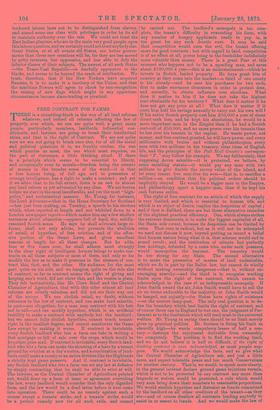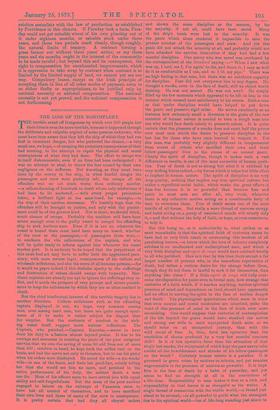FREE CONTRACT FOR FARMS.
THERE is a stumbling-block in the way of all land reforms whatever, and indeed all reforms affecting the law of property, over which, we can see quite well, a great many people, particularly members, landlords, influential con- stituents, and lawyers, are going to break their intellectual shins, and that is the right of Contract. We are not quite sure we are not going to break ours also, for of all the social and political questions it is, we frankly confess, the one which puzzles us most, the one which most requires, on the part of statesmen, a little thinking aloud. If there is a principle which seems to be essential to liberty, and occasionally even to morals—freedom being the essence of morals in the broader sense of the word—it is that a free human being, of full age, and in possession of average intelligence, has a right to make a contract ; and yet if we allow that to its full extent, there is an end to almost any land reform as yet advocated by any class. We are beaten before we start in the most insufferable, and yet the most " high- polite," and ecclesiastical manner. Mr. Young, for instance, the Lord Advocate—that is, the Home Secretary for Scotland —has just been making, on Tuesday, a speech to his electors which, when reported at length and not whittled down to a London newspaper report—which makes him say a few shallow sentences about education—appears full of hard, dry, solidly- reasoned Scotch sense. He says he shall advocate large re- forms, shall not only advise, but promote the abolition of entail, of hypothec, of free eviction, and of the offen- sive portion of the Game Laws, and gives excellent reasons at length for all these changes. But he adds, four or five times over, he shall adhere most strongly to the clear right of intelligent human beings to make con- tracts on all those subjects or most of them, and only so far modify the law as to make it presume in the absence of con- tract this, that, and the other. His audience, for the most part quite on his side, and we imagine, quite on the side also of contract, so far as contract means the right of giving and keeping one's word, did not cheer this, and the reason is plain. They felt instinctively, like Mr. Clare Read and the Central Chamber of Agriculture, that with this rider almost all land reforms are utterly valueless, and did not see their way out of the scrape. We can abolish entail, no doubt, without reference to the law of contract, and can make land saleable, in part—not altogether, for a man may contract with his heir not to sell—and can modify hypothec, which is an artificial inability to make a contract with anybody but the landlord ; but we cannot fully abolish hypothec, cannot touch tenant- right in the smallest degree, and cannot ameliorate the Game Law except by making it worse. If contract is inviolable, every Scotch landlord who lets a farm can take in writing a first mortgage or bill of sale over the crops, which would be hypothec gone mad. If contract is inviolable, every Scotch land- lord who lets a farm can make the shooting of a hare by a tenant ground for eviction at a day's notice, and a combination of land- lords could make a county or an entire division like the Highlands a strictly kept game preserve. And if contract is inviolable, any Scotch landlord who lets a farm can set any law at defiance by simply contracting that he shall be able to evict at will. I The lawyers, as the Central Chamber of Agriculture pointed I out, would draw up a form of lease or agreement overriding! the law, every landlord would consider that the only dignified form, and the law would be a dead letter before it ever came into operation. There could be no remedy against such a course except a tenants' strike, and a tenants' strike would be a perfect remedy now for all such evils, and cannot troduced labour laws not to be distinguished from slavery, and armed some one class with privileges in order by its aid to maintain authority over the rest. We could not trust the East Indian planters, who are in the main very good people, upon this labour question, and we certainly could not trust anybody else. Great States, or at all events old States, are better govern- ments than these new creations will be, for they are less moved by petty interests, less oppressive, and less able to defy the inferior classes of their subjects. The newest of all such States —the Trans-Vaal Republic—is fearfully oppressive to the about £100,000 a year—this is an understatement—which he blacks, and seems to be beyond the reach of retribution. We invests in Scotch landed property. He buys great bits of trust, therefore, that if the New Yorkers have acquired country as they come into the market—a third of one county Samana, it is to make it a territory of the Union, and that , is his already—and he uses his purchases for two ends, the maritime Powers will agree to check by non-recognition first to make enormous clearances in order to protect deer, and secondly, to obtain influence over elections. What does it matter to him if he does not take the highest rent obtainable for his territory ? What does it matter if he does not get any price at all ? What does it matter if it costs him half his savings annually to carry out his own will? If his entire Scotch property cost him £50,000 a year of sheer direct cash loss, and he kept his absolutism, he would be a more important man in the Empire than if he had a Scotch rent-roll of £50,000, and no more power over his tenants than he has over his tenants in the capital. He wants power, not money, and free contract granted, he will have power, and every millionaire with brains and without philanthropies, every man with two millions in his treasury, clear ideas of English life, and the principles of the Pall Mall Gazette's correspon- dent "F.," may follow his example. We say deliberately, that supposing Arran saleable—it is protected, we believe, by some entailing statute—it would pay any man with two millions to give double the survey value of the island, and , let every tenant live rent-free for ever—that is, to sacrifice a 1million—on condition that his political orders should be implicitly obeyed. He would be a bigger man in the Empire, and philanthropy apart a happier man, than if he kept his cash fortune entire. be carried out. The landlord's monopoly is too com- plete, the tenant's difficulty in evacuating his farm, with any number of hungry applicants ready to pop in, is too great for any such drastic cure. It may be said that competition would cure the evil, the tenant offering more for good contracts ; but with regard to land, competition is of no effect at all, power being to the freeholder indefinitely more valuable than money. There is a great Peer at this moment who happens not to be a spending man, and saves
The right of free contract for an article of which the supply is very limited, and which is essential to human life, and which is an object of desire, implies the despotism of capital ; and if that is disliked, there are but three alternative remedies of the slightest practical efficiency. One, which always strikes the extreme democrats, is to make the biggest capitalist of all, the State, sole owner, because its despotism can be limited by votes. That cure is radical, but as it will not be attempted we need not discuss it now, beyond putting on record a belief that human nature being what it is, that scheme would end in armed revolt ; and the institution of minute but perfectly free holdings, defended by a caste who, under such pressure, would monopolise the bayonet. The tenantry would
be too strong for any State. The second alternative is to make the possession of masses of land undesirable, which we do in part by the Ballot law, but cannot do wholly without making ownership dangerous—that is, without en- couraging anarchy--and the third is to recognise working limits upon the right of free contract, which cannot be acknowledged in the case of an indispensable monopoly. If John Smith owned the air, John Smith would have to sell the air on terms endurable to the majority, or John Smith would be hanged, not unjustly—for States have rights of existence —on the nearest lamp-post. The only real question is to de- fine the boundary which best limits the right of contract, and of course there can in England be but one, the judgment of Par- liament as to the limitation which will tend most to the universal welfare. Mr. Young in saying there should be no limit merely gives up practical politics. Mr. Scotson in fixing his limit so absurdly high—he wants compulsory leases of half a cen- tury — destroys the enjoyment derivable from ownership too completely. The problem is to find the working limit, and we do not believe it is half so difficult, if the right of limiting contract is once acknowledged, as most people sup- pose. We would acknowledge the facts, and so give what the Central Chamber of Agriculture ask, and just a little more, and expect tolerable peace and too much Conservatism for another century. That is, we would, to speak more clearly, in the general interest declare ground game injurious vermin, which is not to be protected by any contract any more than leopards or wolves would be protected, a rule which would very soon bring down their numbers to reasonable proportions. We would abolish hypothec and distraint as frauds committed by the landlord on all other creditors of the tenant—as they are—and of course disallow all contracts binding anybody to assist in or assent to frauds. And we would make the law of eviction assimilate with the law of production as established by Providence in this climate. If Faraday took a farm, Fara- day could not get saleable wheat of his own planting out of it under eighteen months, or saleable stock under three years, and those two periods mark clearly, though roughly, the natural limits of tenancy. A contract turning a grass farmer out without three years' notice, or say three years and six months, ought in the interest of the community to be•made invalid ; but beyond this and its consequence, the right to compensation for unexhausted improvements, which it is oppression to take away by contract when contract is so limited by the limited supply of land, we cannot yet see our way. Compulsory leases, except on the Irish principle of accepting them in lieu of all other modes of payment, seem to us either thefts or expropriations, to be justified only by national necessity or national compensation. The national necessity is not yet proved, and the national compensation is not forthcoming.



































 Previous page
Previous page